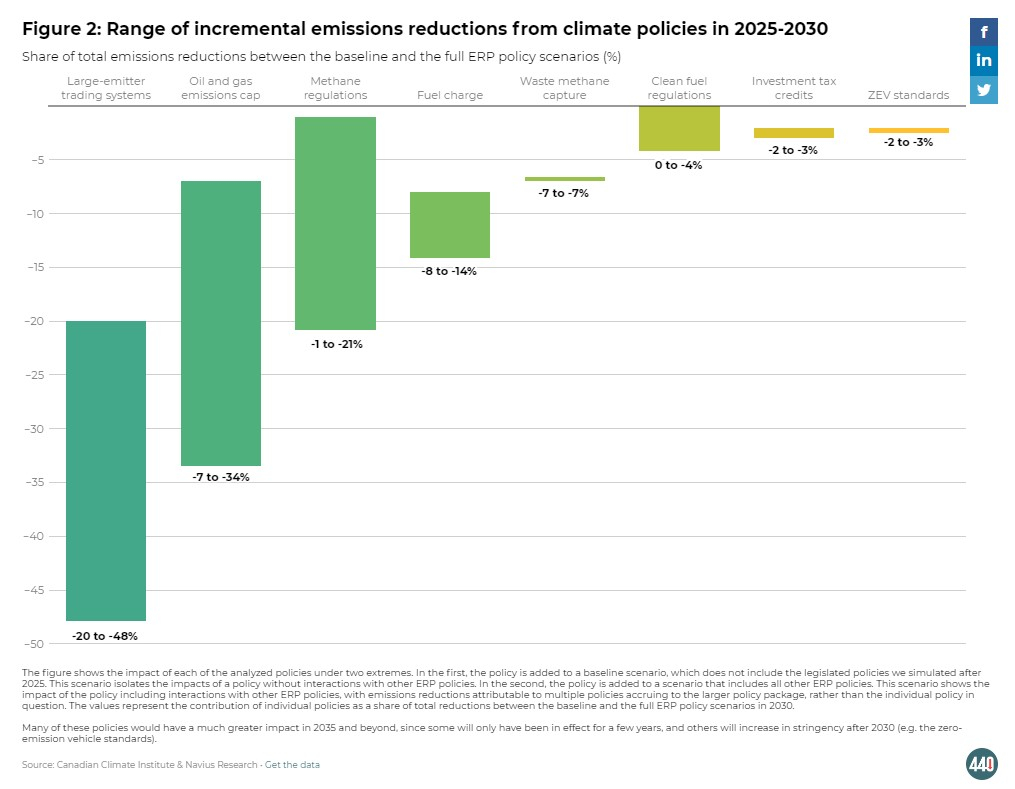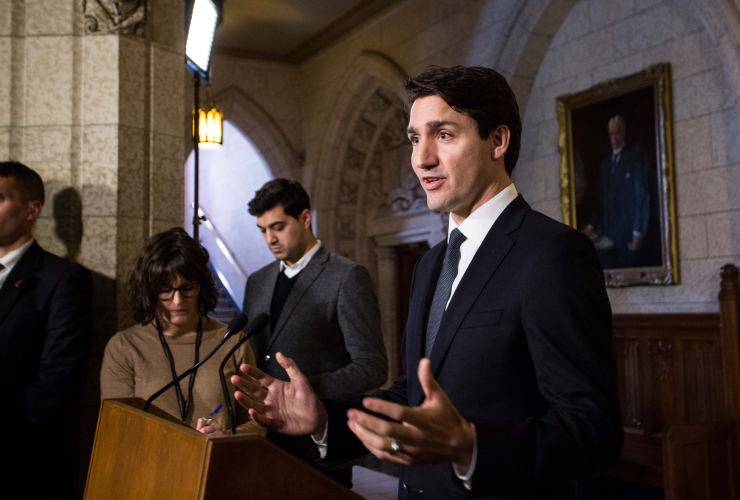Federal Environment Minister Steven Guilbeault is continuing the fight for his government’s signature carbon pricing plan despite Conservative attacks and questions about the efficacy of some aspects of the policy.
A new analysis shows that the industrial emitters pricing system is responsible for more emissions reductions than the consumer fuel charge, which is under siege from the federal Conservatives and many premiers. Opposition to the tax has increased in recent days in advance of the fuel levy increase on April 1.
While the industrial pricing system is responsible for the lion’s share of emissions reductions, Guilbeault said that doesn’t detract from the reductions resulting from the consumer fuel price.
The consumer price will still comprise eight to 14 per cent of Canada’s emission reductions by 2030, and there simply isn’t low-hanging fruit like that up for grabs, said Guilbeault.
“I don't know. I can't find any,” he said.
The analysis by the Canadian Climate Institute looked at which federal climate policies will have the biggest impact by 2030 and found the industrial price on pollution is by far the heaviest hitter. The pricing policy applied to big industrial polluters will cut between 53 million and 90 million tonnes while the consumer carbon pricing charged on fuel purchases will contribute between 19 million and 22 million tonnes annually.
“This analysis clearly demonstrates that climate policy is delivering results — with industrial carbon pricing leading the pack,” said Rick Smith, president of the institute.
“Robust large emitter trading systems are fundamental to any credible climate policy package in Canada.”

When asked if the consumer fuel charge is worth the political cost, Guilbeault said fighting climate change isn’t easy and takes political will. The Liberals and Prime Minister Justin Trudeau have backed their carbon pricing system despite repeated attacks from Conservative Leader Pierre Poilievre, who tried — and failed — to dissolve the government with a non-confidence motion calling for a “carbon tax election.” Poilievre was scheduled to be at a fundraiser in Toronto during the vote on his motion Thursday evening.
Guilbeault said he can’t see a path to achieving Canada’s emissions reduction targets without carbon pricing systems.
“Pierre Poilievre and the Conservative Party, if they win the next election, they will kill just about every measure that we have put in place to fight climate change,” said Guilbeault. Eight environmental groups recently put out a statement warning that the ongoing efforts to pause carbon price increases — and cancel the system altogether — are part of an “ideologically driven effort to limit all climate action.”
The industrial pricing system is doing some heavy lifting when it comes to Canada’s climate targets, but the federal benchmark still needs to be strengthened, according to Canada’s commissioner of environment and sustainable development.
“Some policies in Canada’s climate plan will reduce emissions more than others — but they all add up. Every megatonne of emissions matters,” said Anna Kanduth, director of 440 Megatonnes, in an emailed statement to Canada’s National Observer.
Even if every policy in the country currently legislated or under development is added up, Canada is still likely to fall short of its 2030 emissions target, said Kanduth.
“Any weakening or backtracking on individual policies would require new or stronger measures to fill the emissions gap,” she said.
“When you're not on track to meet your climate targets, it's incredibly important to use every single tool in the toolbox,” said Julia Levin, associate director of national climate for Environmental Defence, in an interview with Canada’s National Observer.
“We have to go after the emissions from the biggest source of emissions — the oil and gas sector — but … even though the fuel charge is way smaller than the large emitter programs, eight to 14 per cent is not a negligible amount of emissions reductions,” said Levin. Some of the policy measures that were analyzed, like the clean fuel regulations and zero-emission vehicle standards, will have a larger impact after 2030, she noted.
“After a week of hearing the official Opposition continue to spread misinformation about climate policy, it is refreshing to have a dose of science and evidence because that's how we should be having conversations in Canada, not based on false information and cynical strategies designed to undermine climate action,” said Levin.
Poilievre is adamant that if his party wins the next election, consumer carbon pricing is toast. He has been less clear about the big emitters system.
Canada's national pollution pricing program applies only in jurisdictions that do not have equivalent policies of their own.
Only Quebec, British Columbia and the Northwest Territories have their own policies for both consumers and big industry.
Six provinces have introduced their own provincial systems for big emitters, all of them because of the federal requirement.
Manitoba, Prince Edward Island, Yukon and Nunavut use both the federal consumer levy and Ottawa's big emitters program.
— With files from The Canadian Press
Natasha Bulowski / Local Journalism Initiative / Canada’s National Observer
Meanwhile: housing
Meanwhile: housing unaffordability and insecurity at record levels, LPC spending more than 30 billion on TMX, Canada's youth facing a mass mental health crisis, healthcare system largely in shambles, electoral reform abandoned, CPC poised to win massive majority (and make zero credible policy changes to improve any of this abysmal situation).
It's fitting that this article uses "to the hilt", as Guilbeault has thoroughly impaled himself on this massive failure to uphold and maintain what was in many ways a sensible policy.
Government cannot be all
Government cannot be all things to all people. They pick and choose their battles and frankly, climate change is at the top of the heap.
Exactly, and it's always been
Exactly, and it's always been a considerable heap that is expanding like never before in human history, so what makes sense is to keep the overall philosophy behind governance in mind. Unfortunately but also fortunately, it's also never been easier when the entire right wing has "lost it."
And consider this assessment of the demonstrable and deleterious results of the "drip drip drip" effect of social media AND media demonizing Trudeau specifically and "liberalism" generally:
https://thetyee.ca/Culture/2024/03/21/Adam-Gopnik-New-Yorker-Shocked-Can...
Mind you, government can be
Mind you, government can be quite a lot of things to many people. And it can be, and in some of the happiest and most prosperous societies in the world it is, more things to more people than ours is right now. There is room for adding a few battles. Especially if, to the richest people, government is a thing that makes them pay some goddamn taxes.
Canadian Climate Institute:
Canadian Climate Institute: “This analysis clearly demonstrates that climate policy is delivering results — with industrial carbon pricing leading the pack."
Not in the O&G industry — Canada's highest emitting sector.
The O&G industry's grossly under-reported emissions are essentially flat since 2011 and 2016.
Oilsands emissions do nothing but climb year after year.
The arithmetic around emissions is undercut by the fact that Canada's O&G industry grossly underreports its emissions (of all types).
The federal government miscalculates emissions from the forestry industry as well. Ottawa's creative accounting turns a net carbon source on the scale of the AB oilsands into a carbon sink.
"Canada should close the logging gap in its climate plan" (National Observer, May 9 2023)
https://www.nationalobserver.com/2023/05/09/opinion/canada-should-close-...
*
Federal and provincial carbon pricing schemes for large industrial emitters shields them from carbon pricing. The purpose of the OBPS and its provincial counterparts is not to expose heavy emitters to the carbon price, but to shield them from it, so they can remain competitive in global markets. Large industrial emitters, including in AB's oilsands, effectively pay a fraction of consumer rates. Under Alberta's Technology Innovation and Emissions Reduction Regulation (TIER) pricing regime, major O&G companies pay pennies on the dollar in carbon costs.
In Alberta, TIER dollars are effectively recycled back to industry to fund carbon capture technology and research. Projects industry should be paying for in the first place.
Federal and provincial carbon pricing systems do not impair large industrial emitters' profits — or reduce their emissions.
"Canada's biggest emitters are paying the lowest carbon tax rate" (Corporate Knights, 2022)
"Oil and gas producers pay among the lowest average carbon costs of any sector…
"There's a patchwork of OBPS policies across the country, and some provinces have implemented 'weak' or 'non-existent' systems that have let many big polluters off the hook."
"...Ottawa and most provincial governments grant heavy exemptions to a number of sectors, including O&G, chemicals, cement, steel and mining.
"But generous exemptions mean that how much of a firm's actual emissions are taxed varies widely by province, and, on average, companies end up paying for only 16% of the carbon actually produced.
"[In 2020, Suncor's] average carbon cost was roughly $2.10 per tonne, about one-14th of the full carbon price."
https://www.corporateknights.com/climate-and-carbon/canadas-biggest-emit...
So do Climate Action Network
So do Climate Action Network Canada, Ecojustice, Greenpeace, CAPE, Environmental Defence, etc. somehow not KNOW all of this? What on earth are they thinking then?
The Liberals, NDP, Greens and
The Liberals, NDP, Greens and Bloc defeated a non confidence motion by the Conservatives to kill the scheduled carbon tax increase.
Democracy in action.
Now, the NDP, Greens and Bloc could cooperate and push the ruling but waning Liberals to take more action on climate and a selection of other top priorities.
That too is democracy, and is arguably the kind of cooperative democracy a majority of Canadians want and would support with their vote.
Indeed, it was great to see
Indeed, it was great to see the actual Canadian majority of serious, responsible adults standing with the Liberals to stare down the peanut gallery/convoy/chippy bad boys.
Math's the thing in democracy; take note.
Thanks for including the
Thanks for including the Greens among the Parties that defeated the Conservative motion -- something the article itself and its sub-headline failed to do.
It appears to me that those
It appears to me that those who have invested in fuel efficient vehicles and drive near the sped limit see the need for collective pricing social actions. I would also suggest that those driving luxury trucks and SUVs that generally drive at 25% over the speed limit on Ontario's 400 series highways have ignored the clear signals of carbon pricing and now whine about it. We need to stay the course on pricing.






Comments